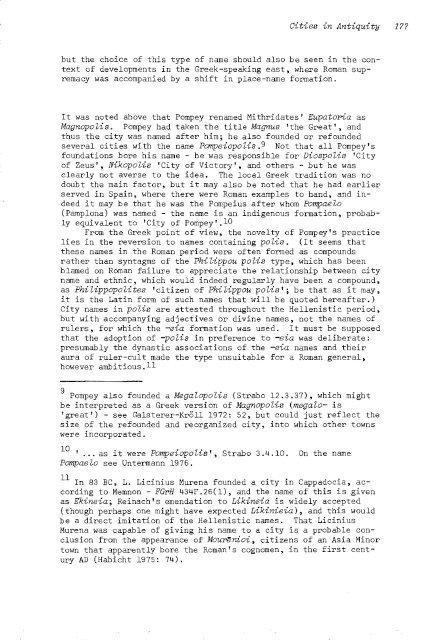CONTENTS NO.I - Institute of Social and Cultural Anthropology ...
CONTENTS NO.I - Institute of Social and Cultural Anthropology ...
CONTENTS NO.I - Institute of Social and Cultural Anthropology ...
Create successful ePaper yourself
Turn your PDF publications into a flip-book with our unique Google optimized e-Paper software.
Cities in Antiquity 177<br />
but the choice <strong>of</strong> this type <strong>of</strong> name should also be seen in the context<br />
<strong>of</strong> developments in the Greek-speaking east, where Roman supremacy<br />
was accompanied by a shift in place-name formation.<br />
It was noted above that Pompey renamed Mithridates' Eupatoria as<br />
MagnopoZis. Pompey had taken the title Magnus 'the Great', <strong>and</strong><br />
thus the city was named after him; he also founded or refounded<br />
several cities with the name PompeiopoZis. 9 Not that all Pompey's<br />
foundations bore his name - he was responsible for DiospoZis 'City<br />
<strong>of</strong> Zeus', NikopoZis 'City <strong>of</strong> Victory', <strong>and</strong> others - but he was<br />
clearly not averse to the idea. The local Greek tradition was no<br />
doubt the main factor, but it may also be noted that he had earlier<br />
served in Spain, where there were Roman examples to h<strong>and</strong>, <strong>and</strong> indeed<br />
it may be that he was the Pompeius after whom PompaeZo<br />
(Pamplona) was named - the name is an indigenous formation, probab~<br />
ly equivalent to 'City <strong>of</strong> Pompey'.lO<br />
From the Greek point <strong>of</strong> view, the novelty <strong>of</strong> Pompey's practice<br />
lies in the reversion to names containing poZis. (It seems that<br />
these names in the Roman period were <strong>of</strong>ten formed as compounds<br />
rather than syntagms <strong>of</strong> the PhiZippou poZis type, which has been<br />
blamed on Roman failure to appreciate the relationship between city<br />
name <strong>and</strong> ethnic, which would indeed regularly have been a compound,<br />
as PhiZippopoZites 'citizen <strong>of</strong> PhiZippou poZis'; be that as it may,<br />
it is the Latin form <strong>of</strong> such names that will be quoted hereafter.)<br />
City names in poZis are attested throughout the Hellenistic period,<br />
but with accompanying adjectives or divine names, not the names <strong>of</strong><br />
rulers, for which the -eia formation was used. It must be supposed<br />
that the adoption <strong>of</strong> -poZis in preference to -eia was deliberate:<br />
presumably the dynastic associations <strong>of</strong> the -eia names <strong>and</strong> their<br />
aura <strong>of</strong> ruler-cult made the type unsuitable for a Roman general,<br />
however ambitious.ll<br />
9 Pompey also founded a MegaZopoZis (Strabo 12.3.37), which might<br />
be interpreted as a Greek version <strong>of</strong> MagnopoZis (megaZo- is<br />
') - see Galsterer-Kroll 1972: 52, but could just reflect the<br />
<strong>of</strong> the refounded <strong>and</strong> reorganized city, into which other towns<br />
were incorporated.<br />
10 , . P' 1',<br />
... as lt were ompe~opo&~S , Strabo 3.4.10. On the name<br />
PompaeZo see Untermann 1976.<br />
11 In 83 BC, L. Licinius Murena founded a city in Cappadocia, according<br />
to Memnon - FGrH 434F.26(1), <strong>and</strong> the name <strong>of</strong> this is given<br />
as Ekineia; Reinach's emendation to Likineia is widely accepted<br />
(though perhaps one might have expected Likinieia) , <strong>and</strong> this would<br />
be a direct imitation <strong>of</strong> the Hellenistic names. That Licinius<br />
Murena was capable <strong>of</strong> giving his name to a city is a probable conclusion<br />
from the appearance <strong>of</strong>Mou~nioi, citizens <strong>of</strong> an Asia Minor<br />
town that apparently bore the Roman's cognomen, in the first century<br />
AD (Habicht 1975: 74),

















